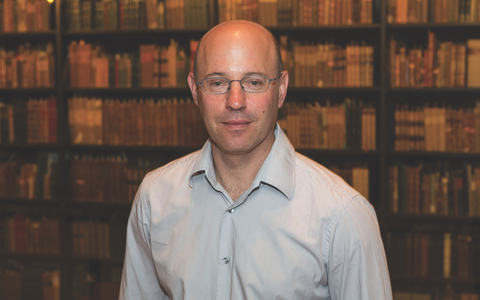“Politics Seeps into Your Bones”: Q&A with Jonny Steinberg, Senior Lecturer
Jonny Steinberg is Senior Lecturer in African Studies at the MacMillan Center and Senior Lecturer in Political Science at Yale. His most recent book, "Winnie and Nelson: A Portrait of a Marriage," which was published in 2023, takes in a century of South African history through the prism of the marriage of Nelson Mandela and Winnie Madikizela-Mandela. Until 2020, he was Professor of African Studies at Oxford University and Visiting Professor at the Wits Institute for Social and Economic Research (Wiser) at Wits University in Johannesburg.
Join us Thursday, November 21:
Your most recent book about the Mandelas won the 2023 National Book Critics Circle Award for Biography... what are you working on now?
I'm working on a biography of Cecil John Rhodes, the British imperialist. He's a tough nut to crack. The first time I felt that I got under his skin was when I visited his grave. He chose to emulate the burial site of Mzilikazi Khumalo, the founder of the Ndebele nation, the nation that he, Rhodes, had conquered. Pretty interesting that he identified so strongly with the man whose polity he had destroyed. Where a powerful person much concerned with his legacy chooses to be buried can be revealing in unexpected ways.
Could you share a little bit about your backstory as a South African?
I was an undergraduate student in Johannesburg during the final years of apartheid and the transition to democracy. When you live through such momentous times in your youth, politics seeps into your bones. It's a privilege to witness firsthand how fluid the world can be, how the rules governing everyday relationships suddenly dissolve and have to be figured out again. From early adulthood I knew that I wanted to write about the forces that shape the world around me. It's pretty fortunate to know what you want to do from early on, and never to lose your passion for it.
What are you enjoying most about teaching at Yale?
A particularly rewarding course I teach is called "Pandemics in Africa". It starts with the Spanish Flu and ends with COVID. All the students in the room have vivid memories of the COVID pandemic. What I ask them to do is reel back a century, spend two months of classes moving slowly towards the present, and then reflect on their memories of COVID again. Bringing historical depth to your own experiences is so often revelatory. Also, most students in the class are American, but some are African. The comparative experience in the classroom is often mind blowing: a snapshot of the global present in all its strangeness brought to life through the totality of students' own recollections.
Can you tell us a bit about this current moment in South Africa’s history and what we can expect from this Thursday’s discussion?
South Africa has just passed a historic milestone. Thirty years into democracy, the ruling party, the ANC, has finally lost its majority and has been forced to share power in a coalition with some of its fiercest opponents. It really is a new era.
The three people on the panel are all protagonists in South African politics: Trevor Manuel, who was finance minister for thirteen years; Helen Zille, the most prominent opposition politician in the country; and Tembeka Ngcukaitobi, one South Africa's leading lawyers and public intellectuals. The three of them agree on very little and are all seriously forceful personalities, so it promises to be an interesting ninety minutes.
- Good Governance

